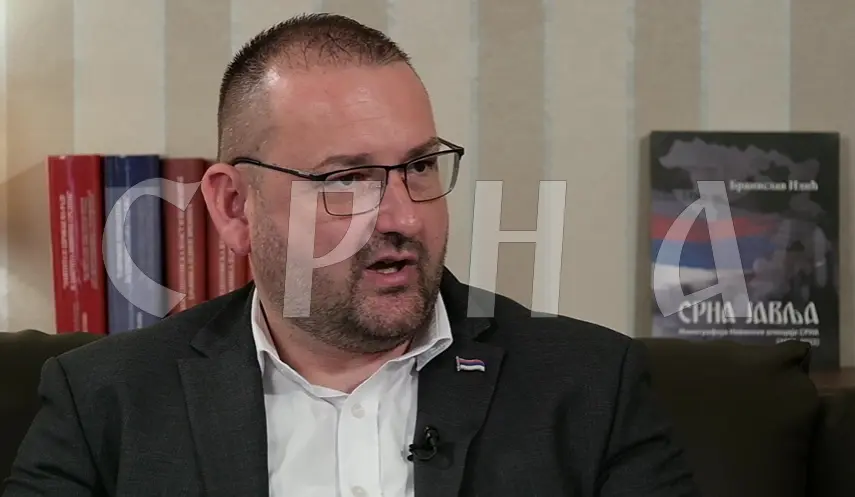NUŽDIĆ: ONE THIRD OF ALL SERBIAN KILLING SITES ARE LOCATED IN THE PODRINJE REGION
Republika Srpska - culture of remembrance
06/28/2025
11:56

BANJA LUKA, JUNE 28 /SRNA/ - The fact that one third of all mass killing sites are located in the Podrinje region indicates the scale and severity of crimes committed against the Serb population in this area, Viktor Nuždić, acting director of the Republika Srpska Center for Research of War, War Crimes, and the Search for Missing Persons, told SRNA.
Nuždić said that Serb villages in Podrinje were nearly deserted during World War II due to mass crimes committed by units of the Black Legion led by Jure Francetić and by Muslim militias.
“Unfortunately, neither in the second half of 1992, nor in the early months of 1993, did the Serb people in Podrinje escape a similar fate,” Nuždić stated.
He noted that during the compilation of the Atlas of Crimes against Serbs in the Defense Patriotic War, 76 mass killing sites were documented where four or more individuals perished during 1992.
“Of that number, 26 killing sites are located in the middle Podrinje region,” Nuždić said.
According to him, two major crimes committed at the beginning of 1993 - first in Kravica, and then in Skelani - must not be overlooked.
“Serb victims have been systematically belittled and denied to this day. No one disputes that other peoples were also victims, but completely ignoring the suffering of Serbs in Podrinje during 1992 and 1993 cannot contribute to an objective and comprehensive understanding of the tragic events of that period, nor reconciliation among the peoples,” Nuždić said.
According to him, Bosniak political representatives, as well as part of the international community, have made efforts to make this approach a practice.
"Particular responsibility lies with the judicial institutions that were called upon to deliver justice and enable reconciliation. Only four individuals have been convicted by the Court of BiH for crimes against Serbs throughout the entire Podrinje region, receiving a total of 29 years in prison. Such a verdict sends a clear message about how Serb victims are perceived," Nuždić emphasized.
He assessed that the acquittals of Naser Orić, both by the Hague Tribunal and the Court of BiH, sent a clear message to the Serbs that there is no justice for Serb children like Slobodan Stojanović and the Dimitrijević brothers, nor for the massacred families of Brane Vučetić, Slavka Matić, and Cvjetko Ristić.
“Because of all this, the Republika Srpska Center for Research of War, War Crimes, and the Search for Missing Persons has documented these crimes, recorded the victims, and collected available photographs. For each victim, the manner of their death has been described, and through thorough research, the crimes and events in which they perished have been reconstructed,” Nuždić said.
According to him, this material, together with the documentary films in whose production the Center actively participated, represents a lasting historical value and evidence of the suffering of Serbs in Podrinje.
"We do not forget, and as every year, we will gather on July 5 in Bratunac to pay tribute to the innocently killed Serbs. This year, as in previous years, unfortunately, we do not expect the presence of representatives of the international community or Bosniak politicians. By their absence, they once again send the message that Serb victims do not exist for them," Nuždić said.
He emphasized that a message would be sent indicating that these victims will never be forgotten.
"Their lives are built into the foundations of Republika Srpska - the only guarantor of the survival of the Serb people in this region," Nuždić stated.
The 33rd anniversary of the suffering of the Serb people in central Podrinje and Birač, where 3,267 Serbs were killed during the past war, will be marked on July 5 in Bratunac.
That day will be declared a Day of Mourning in Republika Srpska, and a memorial service for the victims will be held by Patriarch Porfirije, with the attendance of the highest officials of Republika Srpska and Serbia.

SERBS IN TEARS AND FEAR OVER OWNERSHIP OF ORTHODOX CEMETERIES AND CHURCHES

CVIJANOVIĆ DEMANDS ACCOUNTABILITY FOR SHAMEFUL CONCERT IN ŠIROKI BRIJEG

OSTOJIĆ URGES BiH AND EU TO ACT OVER GLORIFICATION OF FASCIST IDEOLOGIES





